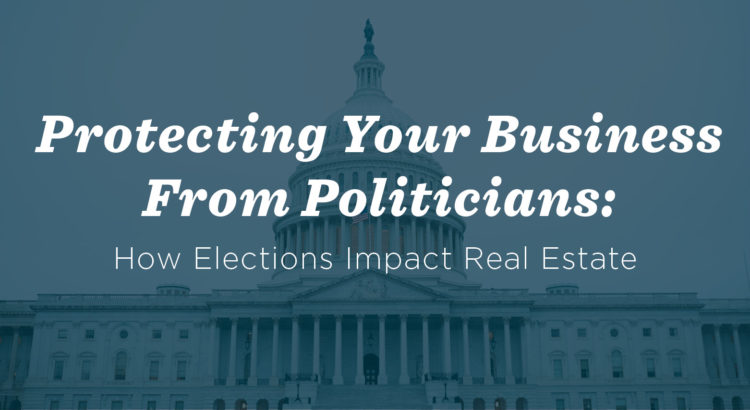How does the country’s political climate affect the real estate cycle and, more specifically, what does that mean for you, as a real estate professional?
One of the biggest factors behind the housing crash and recession was politicians demanding banks become more lenient in their loan process, including loosening the criteria on lending, which allowed many people with subpar credit to obtain home loans they otherwise wouldn’t have been able to afford.
This illustrates the connection between politics and real estate , and the effects the former can have on the latter. Part of what affects how this cycle evolves and progresses are the platforms and policies of the administrations that are in office at the time. Here, we’ll walk you through how this cycle works and how it can be affected by who is in the office and why.
The real estate cycle
The real estate cycle tends to follow four distinct phases. As an agent, you’ll want to develop a business plan flexible enough to weather these shifts in the market.
- Recovery. The recovery phase occurs just after a recession and is the bottom of the real estate trough. In this phase, both occupancy rates and rental rates are low, due to low and diminished demand.
- Expansion. In the expansion phase, the market is on an upward swing, due to an increase in demand. Here, a generally strong economy and job growth (both affected by the political climate at the time) help drive occupancy rates and rent upward.
- Hypersupply. The hypersupply phase occurs after expansion, and describes the time when the equilibrium between real estate supply and demand tips toward oversupply, due to overbuilding. A true mark of hypersupply is rising vacancy rates. Rent growth may still remain positive, but you’ll also notice declining levels.
- Recession. While a recession sounds bad, and it can be truly difficult for some buyers who came to the market late because they didn’t see the recession coming, it can also be a great opportunity for savvy buyers. Prescient investors are able to spot a recession coming, and may have already moved some of their assets from stocks to cash so they can take advantage of some of the great real estate offers that come available. While it is likely we will be in some sort of recession in 2020, economists argue that the housing market will be largely insulated from it.
How you can protect your business
It’s no secret that your clients turn to you to be their local real estate expert. Today, technology has made it easier than ever for consumers to gain access to the basic information they need about many aspects of the real estate industry. By becoming an expert in your local market, you demonstrate to your clients your value, and how it far exceeds just gathering basic information.
Polling various real estate groups, the adversarial conditions prevailing in the current political arena were frequently cited as being major issues that directly affect real estate, and also indirectly through the impacts these issues have on the economy.
Understanding the impacts the political climate has on your local market is a great way to demonstrate thought leadership and set yourself apart as an industry expert. In fact, this often translates into increased business. To learn more about how to understand your local market like a pro in seven easy steps, sign up for our course Learning Your Real Estate Market today.
AgentEDU® is a platform where agents at every level can come to watch 10-minute video courses for the many situations that successful agents must master. From essential to advanced level and everything in between, AgentEDU® courses help agents become top producers with increased earnings and a plan for continued growth.AgentEDU® is an Agent Publishing brand. For 18 years, Agent Publishing has been committed to providing residential real estate professionals with the information and training required to build successful and meaningful careers in their local markets. Agent Publishing’s influence extends to every career stage and reaches agents across print, digital, events and online learning.


